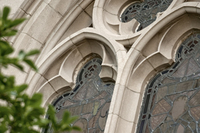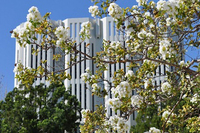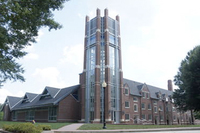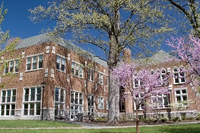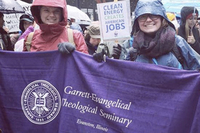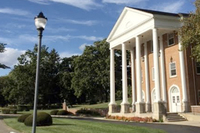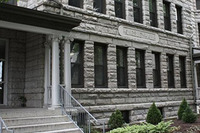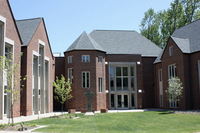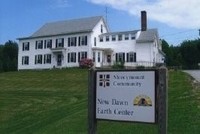Search
133 items
-
Engaged Organizations: Boston University School of Theology
Boston University School of Theology participates in the Green Seminary Initiative. In addition to their larger mission (as stated on their website at https://www.bc.edu/content/bc-web/schools/stm.html), the GSI website describes their environmental efforts:
"Located in Boston, MA, Boston University School of Theology is a United Methodist seminary with broad ecumenical connections, including Episcopal and United Church of Christ Communities of Learning. BU has been actively working toward ecological justice since 2008, and built green initiatives into their strategic plan in 2010. BU brings to the Green Seminary Initiative an expertise in how to imagine what is possible as a theological school embedded in a large university that is also committed to ecological sustainability. They also exemplify what it means to transform curriculum and communal practice, and renovate aged buildings."
Boston University School of Theology strives to infuse care of the earth into all aspects of theological education. -
Engaged Organizations: Christian Theological Seminary
Christian Theological Seminary participates in the Green Seminary Initiative. In addition to their larger mission (as stated on their website at https://www.cts.edu/), the GSI website describes their environmental efforts:
"Christian Theological Seminary in Indianapolis, IN, is an ecumenical Christian theological institution. The school has nurtured ecological care in theological education through several course offerings, through courses taught by Dr. Marti Steussy and Dr. Carol Johnston, as well as a contextual study opportunity in Appalachia, offered by Dr. Suzanne Coyle. Dr. Robert Saler has published articles on environmental theology, while Dr. Carol Johnston, a long-time eco-theological leader in the Presbyterian Church (USA), has also published numerous books and articles and lectured internationally on religion and ecology. Dr. Felicity Kelcourse has supported community efforts to preserve Crown Hill a 30 acre pre-settlement remnant forest near the seminary that is threatened with deforestation."
Christian Theological Seminary strives to infuse care of the earth into all aspects of theological education. -
Engaged Organizations: Claremont School of Theology
Claremont School of Theological participates in the Green Seminary Initiative. In addition to their larger mission (as stated on their website at https://cst.edu/), the GSI website describes their environmental efforts:
"Claremont School of Theology in Claremont, CA, is a United Methodist Church seminary. Ecological sustainability has been a priority for the school since the tenure of Professor John Cobb, an early eco-theologian who began work at Claremont in 1960. Claremont held its first conference on the environmental crisis in 1971. The leaders of Claremont’s Green Team, Dr. Philip Clayton and Kristin Ritzau, shared with GSI that they see the certification process as a way to become a place of ecological education and empowerment for seminary leaders, students, and community members in Southern California. Claremont enters the program eager to share its curriculum and syllabi from multiple eco-classes and programs."
Claremont School of Theology strives to infuse care of the earth into all aspects of theological education. -
Engaged Organizations: Columbia Theological Seminary
Columbia Theological Seminary participates in the Green Seminary Initiative. In addition to their larger mission (as stated on their website at https://www.ctsnet.edu/), the GSI website describes their environmental efforts:
"Columbia Theological Seminary, a school in the Presbyterian Church (USA), has been a leader in ecological theological education for the last decade. They have two LEED Gold buildings on campus in Decatur, GA, was one of the founding members of the Seminary Stewardship Alliance, and their late president Steve Hayner began a Sustainability Commission that continues to this day. They also bring to the certification program a commitment to health, imagination, and resilience."
Columbia Theological Seminary strives to infuse care of the earth into all aspects of theological education. -
Engaged Organizations: Drew Theological School
Drew Theological School participates in the Green Seminary Initiative. In addition to their larger mission (as stated on their website at https://www.drew.edu/theological-school/), the GSI website describes their environmental efforts:
"Drew Theological School, a seminary of the United Methodist Church and part of Drew University in Madison, NJ, hosts The Green Seminary Initiative. Professor Laurel Kearns heads the Green Team, which also includes Dr. Catherine Keller and Dr. Heather Elkins on the faculty. All three publish, teach, and lecture on topics related to theology and eco-justice, joined by several other faculty who bring environmental concerns into their classes. Recently, eco-justice began to be integrated throughout the curriculum, building on almost two dozen courses with an ecological focus, including several required courses. Students can focus on religion and ecology in all degree programs. Drew’s other environmental initiatives include environmental justice field trips, native species and integrated pest management, water bottle refilling stations, reusable cutlery and sustainable food options. The campus includes a community garden, arboretum, labyrinth, native species planting, and a forest. The school is particularly proficient in establishing environmental policies to guide its institutional practices, and integrating environmental themes into chapel services, curriculum, speakers, cross-cultural trips, and broad social justice work."
Drew Theological School strives to infuse care of the earth into all aspects of theological education. -
Engaged Organizations: Garrett-Evangelical Theological Seminary
Garrett-Evangelical Theological Seminary participates in the Green Seminary Initiative. In addition to their larger mission (as stated on their website at https://www.garrett.edu/garrett-evangelical-theological-seminary), the GSI website describes their environmental efforts:
"Garrett-Evangelical Theological Seminary has offered five courses, taught by Assistant Professor of Theology and Ecology Dr. Timothy Eberhart, which incorporate ecological teachings into seminary education. A founder of the Seminary Stewardship Alliance (SSA), Garrett-Evangelical has been a leader in environmental education in Evangelical seminaries and is committed to integrating ecological perspectives and sustainable practices throughout the curriculum, the school’s worship, and spiritual life, programming, buildings and grounds, and administrative operations."
Garrett-Evangelical Theological Seminary strives to infuse care of the earth into all aspects of theological education. -
Engaged Organizations: Methodist Theological School in Ohio
Methodist Theological School in Ohio participates in the Green Seminary Initiative. In addition to their larger mission (as stated on their website at https://www.mtso.edu/), the GSI website describes their environmental efforts through the following excerpts:
"MTSO has a Sustainability and Land Initiative, which includes Seminary Hill Farm, a certified organic farm that makes it possible for MTSO to incorporate environmental learning into student life. This farm plays a prominent role in the school’s Ecology and Social Justice specialization."
"The Sustainability and Land Initiative seeks to further MTSO’s aspiration to 'prepare and invigorate transformational leaders to engage the church and the world in leadership and service' by creating a 'sustainable campus plan which establishes a model for theological education through the cultivation of sustainable teaching and learning communities on our land.' Current practices in sustainability include 90% of all food served in Dunn Dining Hall being sourced from organic and humane farms within 50 miles of campus, a Community Supported Agriculture (CSA) program, and commitments to urban farming partners in nearby Columbus. The campus has also installed geothermal heating/cooling and solar panels to power its administration and academic buildings."
Methodist Theological School in Ohio strives to infuse care of the earth into all aspects of theological education, including its offering of eight distinct religious-environmental courses. -
Engaged Organizations: Pacific Lutheran Theological Seminary
Pacific Lutheran Theological Seminary participates in the Green Seminary Initiative. In addition to their larger mission (as stated on their website at https://www.plts.edu/), the GSI website describes their environmental efforts:
"Pacific Lutheran Theological Seminary (PLTS) is a seminary of the Evangelical Lutheran Church in America, a graduate school of California Lutheran University, and a founding member of the Graduate Theological Union interfaith consortium in Berkeley, CA. PLTS decided to enter the Certification Program soon after their president Dr. Chris Kimball signed the Second Nature Climate Commitment, committing both the university and seminary to achieving carbon neutrality and developing strategies for resilience. PLTS has moved recently to a new urban campus in the heart of Berkeley, and is committed to exploring the relationships between earth care and justice issues of race, class, and gender."
Pacific Lutheran Theological Seminary strives to infuse care of the earth into all aspects of theological education. -
Engaged Organizations: The Samuel DeWitt Proctor School of Theology
The Samuel DeWitt Proctor School of Theology participates in the Green Seminary Initiative (GSI). In addition to their larger mission (as stated on their website at https://www.vuu.edu/theology), the GSI website discusses their environmental efforts:
"Located in Richmond, VA, the Samuel DeWitt Proctor School of Theology, Virginia Union University (STVU) has developed a commitment to ecology and theology in caring for creation which is rooted and grounded in the school's historical commitment to social justice, civil rights, and activism. STVU offers students the opportunity to engage ecological issues across many areas of its curriculum. As early as 2010, ecology was included as an important theological issue in required systematic theology courses."
-
Engaged Organizations: Trinity Lutheran Seminary
Trinity Lutheran Seminary participates in the Green Seminary Initiative. In addition to their larger mission (as stated on their website at https://www.capital.edu/trinity-lutheran-seminary-at-capital-university/), the GSI website describes their environmental efforts:
"Located in Columbus, OH, and a seminary in the Evangelical Lutheran Church of America, Trinity has engaged in a number of steps required in the certification process, including an energy audit, updating the seminary’s HVAC system, tracking campus energy use, and enhancing recycling efforts. The student group SEEDS held a retreat in April at Lutheran Memorial Camp and students have participated in a Faith Climate Action Rally at the Ohio Statehouse. In addition, Trinity students have been active in cleaning up the Alum Creek watershed that borders the seminary property. The school has cultivated a garden, and students, faculty, and staff held a worship service to bless it. The school engages with the natural landscape surrounding the campus through hikes and excursions."
Trinity Lutheran Seminary strives to infuse care of the earth into all aspects of theological education.
-
Engaged Organizations: Universidad Biblica Latinamericana
Universidad Biblica Latinamericana participates in the Green Seminary Initiative. In addition to their larger mission (as stated on their website at http://ubl.ac.cr/), the GSI website describes their environmental efforts:
"Universidad Biblica Latinoamericana joins the Seminary Environmental Certification Program from San Jose, Costa Rica. The school elected two years ago to make “planetary life” a key aspect of teaching, research, and community life, and believe that the certification program will assist them with incorporating these goals. “It is our desire to make this a learning experience for faculty, staff and especially students who can reproduce these process in their churches and communities,” writes Rectora Elisabeth Cook. “Our location in Central America, an area of the world that is highly vulnerable to the effects of climate change, offers a privileged contexts from which to address environmental justice through theological reflection and missional action.” The UBL brings to the certification program numerous ties to the international, national, and regional communities, along with a network of students and graduates throughout the region who are committed to issues of environmental justice."
Universidad Biblica Latinamericana strives to infuse care of the earth into all aspects of theological education. -
Engaged Organizations: Union Presbyterian Seminary, Charlotte
Union Presbyterian Seminary, Charlotte, participates in the Green Seminary Initiative. In addition to their larger mission (as stated on their website at https://www.upsem.edu/alumni-connect/charlotte-campus/), the GSI website describes their environmental efforts:
"Union Presbyterian Seminary at Charlotte is a part-time, non-residential seminary extension of Union Presbyterian Seminary in Richmond, Va. We have a brand new campus located in the fast-growing South Park area of Charlotte. While our home campus is pursuing a partnership with Shalom Farms, incorporating a community garden and classes in the ethics of food and eco-justice, the Charlotte campus is pursuing its commitment to “church and the world” in several different ways. Having just completed our energy audit, we are committed to making an already efficient building more so. We are Including new course offerings that focus on faith and environmental issues, such as Paul Galbreath’s upcoming class on “Ecology and Worship.” Rodney Sadler is challenging us to step up as advocates in areas such as the use of solar energy in congregational and seminary facilities. We look forward to learning from our colleagues in the GSI in the years ahead."
Union Presbyterian Seminary, Charlotte strives to infuse care of the earth into all aspects of theological education. -
Engaged Organizations: Catholic Association of Diocesan Ecumenical and Interreligious Officers
The following is an excerpt from the Catholic Association of Diocean Ecumenical and Interreligous Officers' call to care for creation on their website:
"Catholics now realize that the environment is equally as important as the social issues that have been given attention in the Church and that in fact, certain of these issues are tied inextricably to our care of the earth or lack thereof. Can even one individual live without clean air, water, or food? Can any life be protected without concern for the basic systems and networks required to sustain life? If we “teach a man to fish” but the water is so polluted that fish are poisoned or if overfishing causes them to become extinct, what then?
Catholics in past centuries were not concerned about air, water, soil and climate for the simple reason that these life systems were not endangered. Clergy and faithful had no need to be worried that the water, wheat, or grapes required for our sacramental life might be dangerously polluted or ruined by climate extremes. Current threats to creation are a sign of our times." -
Engaged Organizations: Conference of Major Superiors of Men
Conference of Major Superiors of Men discuss their Care for Creation/Stewards of the Earth component of their organization on their website:
"The goods of the earth are gifts from God, and they are intended by God for the benefit of everyone. There is a "social mortgage" that guides our use of the world's goods, and we have a responsibility to care for these goods as stewards and trustees, not as mere consumers and users. How we treat the environment is a measure of our stewardship, a sign of our respect for the Creator." -
Engaged Organizations: Ignation Solidarity Network
Ignation Solidarity Network discuss their work as it relates to Pope Francis's Laudato Si' encyclical to care for creation and our common home. As stated in their website:
"In his historic encyclical on ecology, Laudato Si’, Pope Francis calls on all people to care for creation and our common home. Pope Francis makes clear that our care for one another and our care for the earth are intimately connected, noting that humanity is not faced 'with two separate crises, one environmental and the other social, but rather one complex crisis which is both social and environmental.' (Laudato Si’: On Care for Our Common Home)."
"We ask our government leaders to demonstrate bold leadership in addressing the climate crisis by honoring the Paris Agreement, contributing to the Green Climate Fund, implementing the Clean Power Plan and supporting just transition and job creation." -
Engaged Organizations: Leadership Conference of Women Religious (LCWR)
Leadership Conference of Women Religious discuss their process for recycling ink cartridges on their website:
"LCWR works with a recycling company, Empties-4-Cash, an organization that rewards those who recycle by paying for each usable empty ink jet cartridge and for each usable empty laser cartridge. LCWR applies the earnings received to the scholarship fund that assists LCWR members who wish to attend the LCWR national assembly but cannot afford to do so.
LCWR congregations are invited to assist in building the scholarship fund by sending their cartridges directly to Empties-4-Cash and having their earnings applied directly to the scholarship fund. Congregations are encouraged to invite companies and other organizations to participate in this effort as well." -
Engaged Organizations: Sisters of Mercy of the Americas
Sisters of Mercy of the Americas has both sponsored and co-sponsored faith based organizations that focus on ecological issues. One of the organizations is Mercy Ecospirituality Center. -
Engaged Organizations: Mercy Ecospirituality Center
Mercy Ecospirituality Center discuss their various environmental/spiritual offerings of their retreat center on their website:
"Mercy Ecospirituality Center of Mercy Ecology, Inc. is a sponsored work of the Sisters of Mercy. We are committed to reflection, education and living gently in mutual relationship with the Earth. We offer hospitality for those seeking solace and to refresh their spirit in the beauty of creation, as well as programs in ecospirituality.
The Benedictine monks of Elmira, NY gave the 39-acre property located in the rural beauty of Vermont to the Vermont Sisters of Mercy. Sisters Judy Fortune and Elaine Deasy directed it as Lumen Christi Retreat House for many years, but after Lumen Christi closed, a group of Sisters established it as an Ecospirituality Center, originally named Mercy Farm in 2010." -
Engaged Organizations: New Dawn Earth Center
New Dawn Earth Center offers sustainability educational programs and activities for both children and adults. As indicated on their Facebook website:
"The New Dawn Earth Center invites everyone to learn from, honor and celebrate the interconnectedness of all life. We aim to create a space where humans can be in relationship with Earth and thereby nurture their own spirit." -
Green Corner Bulletin (St. Camillas Parish, Silver Spring, MD)
St. Camillas periodically issues their Green Corner Bulletin, in support of their stance on creation care as indicated on their website:
"Our preaching and liturgical music deepens our love of creation. Moreover, St. Camillus Church evangelizes by offering the adult faith formation programs on care of creation to parishioners, promoting various activities around Earth Day that spur people to adopt a more sustainable lifestyle, and doing advocacy for policy and legislation.
Our parish community is undertaking an effort to “green” our campus, reduce our energy consumption, and eliminate practices that are wasteful and destructive to God’s creation." -
Catholic Charities USA Prayer for Creation
Catholic Charities USA uploaded a prayer for creation on their website, focusing on cherishing the Earth rather than exploiting, and providing a reminder that we are all connected to each other and the land. This prayer for creation can be used in a variety of setting, especially in liturgical worship. -
Engaged Organizations: Global Catholic Climate Movement
Global Catholic Climate Movement discuss their identity and mission through the following excerpts from their website:
"Who we are
The Global Catholic Climate Movement is a first-of-its-kind international coalition of Catholics from many nations, continents, and walks of life. We are laity, religious, and clergy, theologians, scientists, and activists from Argentina, the Philippines, the United Kingdom, Kenya, Australia, the United States, and many other nations. We are united by our Catholic faith and our work in various roles and organizations on climate change issues."
"First, we recognize that conversations about the climate crisis have historically been more about intellectual arguments than about the profound spiritual and moral implications of our failure to care for God’s creation. Catholic leaders are thus called to speak with a prophetic voice and in a spiritual dialogue with all people, especially those political and business leaders and consumers who engage in climatically destructive policies and practices. And we recognize our own need for ongoing conversion to live more in keeping with the Creator’s intentions for life in abundance for all people. Until the moral implications of anthropogenic climate change are clearly established and accepted, it is unlikely that societies can or will transition in an appropriate timeframe to sustainable technologies, economies, and lifestyles." -
Engaged Organizations: Association of United States Catholic Priests
The Association of United States Catholic Priests discuss their climate change initiative on their website. The following excerpt list the first five "Green Commandments" from Fr. Joshtrom Isaac Kureethadamof's book on Laudato Si':
"Earth, our common home, is in peril. Take care of it.
Listen to the cry of the poor who are the disproportionate victims of the crisis of our common home.
Rediscover a theological vision of the natural world as good news/gospel.
Recognize that the abuse of creation is ecological sin.
Acknowledge the deeper human roots of the crisis of our common home." -
Islamic Declaration on Climate Change
In August of 2015, faith leaders, senior international development policy makers, academics and other experts announced an Islamic Declaration on Climate Change at an International Islamic Climate Change Symposium in Istanbul. The United Nations Framework Convention on Climate Change posted the following statement on their website:
"The leaders called on governments meeting in Paris to 'bring their discussions to an equitable and binding conclusion' bearing in mind:
The scientific consensus on climate change, which is to stabilize greenhouse gas concentration in the atmosphere at a level that would prevent dangerous anthropogenic interference with the climate systems; The need to set clear targets and monitoring systems; The dire consequences to planet earth if we do not do so; The enormous responsibility the COP shoulders on behalf of the rest of humanity, including leading the rest of us to a new way of relating to God’s Earth." -
A Statement of the Baha'i International Community to the UN Climate Change Conference in Paris, France
The Baha'i International Community provided a statement of shared vision regarding climate change at the United Nations Climate Change Conference in Paris, France. This statement from their website discusses the need for renewed individual consciousness, collective action, and redefining relationships to assist with sustainability.

